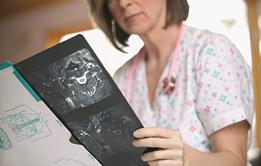The support of a specialist nurse can equip IBD patients to better manage their condition, thereby reducing dependency on hospital services. Claire Read reports

Among the many cards in Bev Davies’ purse is one given to her by her IBD specialist nurse. On it are five symptoms, a phone number and a simple message: if you experience any of the symptoms, call the phone number. For Ms Davies, that card is a crucial part of being able to effectively manage her inflammatory bowel disease.
“It’s so important in terms of self-management, because you know what to look out for,” she explains. “Should we have a reaction to our medication, should we have any concerns, or if we think we’re having a flare up, the first thing that we know we should do is pick up the phone to speak to our IBD nurse, and she will be there. She’s the first point of contact, and her prime job is to keep us well.
“Knowing those five key things can save an awful lot of distress, and eventually money in terms of resources,” she argues.
They’re an encyclopaedia of knowledge. If ever I had any questions, they would either give me the answer or point me in the direction to find the answer
Ms Davies has lived with ulcerative colitis since the age of 11. But she feels having access to an IBD specialist nurse in recent years has finally helped her to cope with it well.
“It is quite a lonely and embarrassing illness for so many people, because a lot of the time you do have to shut yourself in the toilet. I did cut myself off from a lot of people because I didn’t really know how to deal with it in the same way I do now.”
Moeed Majeed also credits an IBD specialist nurse with helping him manage his condition. When he was diagnosed with Crohn’s disease at 19: “I had no idea what it was. So my first question was how do I cure it – obviously not understanding [that it is a chronic condition],” he remembers.
“I had to do my research, and if patients have got questions the specialist nurses are more than happy to answer: they’re an encyclopaedia of knowledge. If ever I had any questions, they would either give me the answer or point me in the direction to find the answer.”
The patient’s view
“What specialist IBD nurses do is so important to people going through this journey, and because they’re so good at it I think it’s taken for granted. But inside my soul and my heart I owe them so much. I can’t imagine doing this whole thing without them – I think there would be a massive disconnect between the consultants and patients. It smooths out the whole journey between the two.”
Moeed Majeed
This is a central part of a IBD specialist nurse’s role, says Julie Duncan. “Generally a newly diagnosed patient will come to see the IBD nurse for a comprehensive discussion about the disease,” explains the IBD nurse manager at Guy’s and St Thomas’ Foundation Trust.
“We discuss how you manage it, how we would expect the course to run. We give education about medicines – things like this is a drug you’re going to take long term, therefore you need to plan ahead; you need to make sure you don’t run out.

“But also how to manage a flare: OK, you’re on these medicines, you can adjust your dosage, you can add in other medications, if you are having these sorts of symptoms you’ve got to get in touch with us because we need to organise investigations. And we can decide on the advice line whether you need to come to clinic, or whether you can manage that situation with support at home.
“It’s knowing who to contact when; how to get in touch with the secretaries, or the appointments team, how to get in touch with the IBD nurse advice line,” she says. “Not everyone’s navigated the NHS, so it’s just knowing who’s responsible for what, and giving patients the responsibility and the authority to make proactive decisions about things as well.”
The nurse manager’s view
“I think specialist nurses often hold the whole thing together – they’re the pivot in the team and help coordinate journeys across the full patient pathway.”
Julie Duncan, IBD nurse manager at Guy’s and St Thomas’ FT
That brokering of care and support of self care also represents a far more sustainable way of caring for patients with long term conditions. At University Hospitals of Leicester Trust, a self management programme for patients with IBD is hought to have released almost £150,000 over five years.
A powerful case for specialist nurses

Specialist nurses are far from just the ‘icing on the cake’ – in inflammatory bowel disease alone they are consistently preventing emergency attendances and ensuring the most appropriate use of services
- 1
 Currently
reading
Currently
reading
Get the support to self-manage with specialist nurses
- 3
- 4

































No comments yet